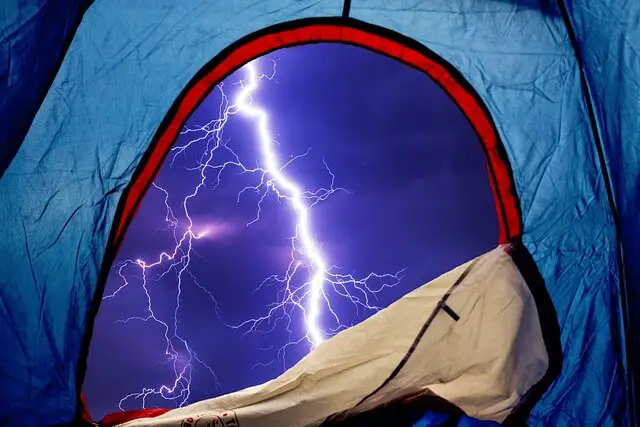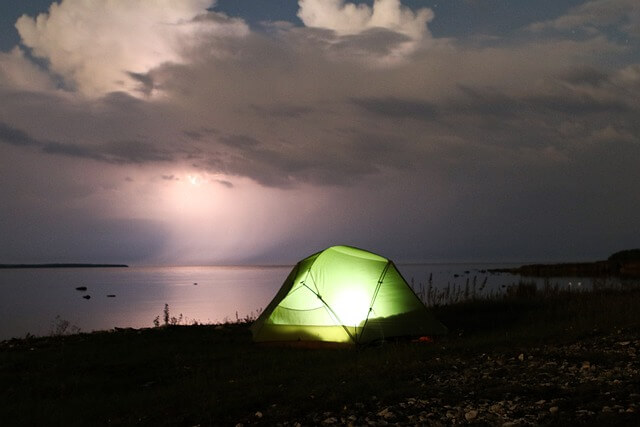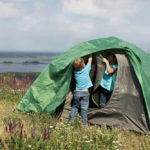Everyone who has been camping knows that it is impossible to predict everything that will happen during the trip. Your trail could be cut short by fallen trees or large fallen branches. You might come across wild animals you must avoid. Sometimes, your trip will be cut short by thunderstorms and lightning.
Today, I will talk about thunderstorms and the best ways to remain safe if you encounter one while on a camping trip. It is not easy to predict a thunderstorm or lightning strike, but it is easy to protect yourself by doing a few simple things.
If you want to learn more about the best ways to avoid lightning injuries while on a camping trip, stick around for the rest of the guide!
More...

Table of Contents
Are You Safe in a Tent in a Thunderstorm?
Being a camper means you need at least some basic knowledge of different weather phenomena and some other things. For example, you should know how to light fires and keep them under control. Then, you should know how to keep your food protected from wild animals that might come lurking at your campsite.
Among other things, you should have some knowledge of how thunderstorms work. First, you should know that thunder is not attracted by some material but by height. The highest building or tree in an area will likely be hit by thunder.
Another thing to know is that the thunder might be looking for metal objects to pass through, or it could go into the ground. So, it would help if you were as far away from metal as possible while also staying on elevated ground to avoid getting hit by the electrical current of the thunder.
With this knowledge in mind, I can tell you more about thunder and their relationship with tents!
So, a tent can be hit by thunder – it is not like the tent has something that can repel the thunder. Still, it would help if you remembered that the tent does nothing to attract the lightning. The only thing that can attract it is the metal poles, if there are any in your tent.
The best thing would be to have a tent that you set on elevated ground, with sturdy poles, and away from open spaces or tall trees that stand alone. Make a note for yourself to remember these pointers. If you apply them when camping, you will be less likely to fall victim to thunder.

How Do You Survive a Thunderstorm in a Tent?
I recommend always checking the weather forecast before going on a camping trip. Extreme temperatures are not advisable for camping – hot weather can cause dehydration and sunburns, whereas cold weather can cause hypothermia.
Besides that, remember that it is not advisable to camp when the chance of a thunderstorm occurring is high. Thunder can be unpredictable and can cause havoc. The electrical current from the thunder can cause fires, landslides, and even death in people and animals hit by or standing close to the thunder.
Still, if a thunderstorm comes suddenly during your trip, you can do a few things to stay safe. Here are some of the things I would recommend:
Find a Good Spot for Your Tent
You should move the tent to a safer location when you see a thunderstorm brewing and have nowhere to hide except in your tent. Move the tent into a densely grown forest, preferably in a spot with short trees. Make sure it is not near water or exposed wiring.
Get a Good Tent
Find a quality tent with plastic poles, long guylines, and a rainfly. You can use the rain fly over your tent to keep the tent from soaking up the rain, whereas the rain fly will also offer a bit of protection from the lightning.
At this point, tents are not lightning-proof. You cannot get a tent that will act as a Faraday cage for you, but I hope that will be possible in the future. There has been some development in that field, so things are heading in the right direction.
Move to the Middle
If you have to stay in the tent and you suspect that lightning could hit your tent, move towards the middle of the tent. Make sure that whatever you are holding or wearing does not touch the tent walls, or the electrical current might go from the walls to your body.
As additional protection, move electrical appliances outside of the tent. Disconnect phones and other devices from power sockets. Still, remember that it is safe to use an unplugged phone, so you can try to call for help.
Stay Away from the Ground
When lightning strikes, it can go into the ground and affect things on the ground. I know that tents will likely stand on the ground, but you do not have to. Try to get something, like a folded sleeping pad or sleeping bag, to keep you elevated from the ground. That way, you will be safer in case lightning strikes.

Where Do You Put a Tent in a Thunderstorm?
The place where you set camp upon arrival can be a different place where you wait for the thunderstorm. You can always take your tent somewhere where it will be safer. Let’s look into the safest spots you can put your tent:
Dense Tree Area
I mentioned before that lightning likes to strike tall things – or even a tall lone tree. So, the tallest trees will attract lightning, and the shorter trees will not attract lightning. The shorter trees will look like flatlands to the lighting, so the lighting will ignore them.
This is good news for you since you can seek shelter in the dense short trees. Try standing under one, or if it has a branch near the ground, try sitting on the branch and keeping your feet elevated from the ground. Consider placing your tent there, too, until the thunderstorm passes.
Away from the Tallest Trees
I already said tall trees attract lightning, so staying away from them is essential. Especially if you find a single tall tree in a large opening – it could be the worst idea to seek shelter under its branches. You would be better off running to the forest, where lightning is less likely to strike.
Away from Open Fields
Open fields are also quite dangerous. If you want to hike to a certain peak during your trip, try to do that when the skies are clear. If a thunderstorm brews, you should not move to open areas with high elevation, as those areas are likely to be struck by lightning.
Away from Open Buildings
Open buildings may seem like areas where you could get some lightning protection, but they could also be subject to direct hits. You might wonder why this is so!
Well, open buildings that do not have electricity or plumbing are not that effective at fighting off lightning strikes since they do not have much isolation. You would be better off finding a large enclosed building with proper electricity if you want to stay protected.
If you find a building that you think is safe, try to do a quick inspection and see if there are exposed or faulty wires. If that is so, you should try to find another shelter. The best thing would be to go to a store, pub, public bathroom, and similar areas.
Away from Water
Last but not least – never put your tent close to the water when a thunderstorm is brewing. Water conducts electricity, so coming in contact with it can cause serious injury.
Another reason staying close to water is not advisable is that it can cause your tent and things to get soaked. It will take a while for everything to dry, leaving you exposed to moisture and cold.
You could either go home with a severe cold or suffer a more serious injury from the lightning storm. Either way, you will be in a world of trouble.
How Can You Stay Safe Camping in Thunderstorms?
There are several ways you can stay safe when camping in a thunderstorm. Depending on your situation, you can go with one of these options. I already mentioned that you can go into the forest, but that is only if you have no other option that seems more secure. Here are the alternatives to consider:
Tent
You should stay in your tent if there are no dense forests with short trees around you. It is better than standing outside in the flatlands, where lightning can likely strike.
Still, ensure you use the pointers I gave before – stay away from the tent walls and try to elevate yourself from the ground. If the latter is not possible, stay on the ground in a crouched position, with nothing but your legs touching the ground.
Car
Staying in your car is a valid option I have yet to mention thus far. You can stay in your vehicle when car camping to protect yourself from the thunder. The actual metal car frame will act as a Faraday cage and move the electricity through the walls to the ground.
If you are staying in your car during a thunderstorm, there are a few things to remember. Keep the vehicle turned off and close all windows. Refrain from opening them because that will break the cage and allow electricity to move inside the car.
Another thing you should not do is touch anything that is connected to metal – the steering wheel, the gear shifter, commands on the doors, etc.
Try to stay calm and not touch anything. Keeping your hands relaxed in your lap would be the best thing.
Cave
If there are nearby caves, you can try staying in them for the duration of the thunderstorm. Make sure there is a large opening you can use to move in and out and that you always have an eye on that opening. It would help if you made sure you did not move too deep into the cave, where you could not breathe or you could stay trapped.
Building
I already mentioned this: staying in an enclosed building is smart. Ensure the facility has proper electricity and plumbing, as that will act as isolation between the building and the thunder. If possible, stay in the building from the beginning of the thunderstorm until 30 minutes after you hear the last sound of thunder.
Can Lightning Go Through a Tent?
In the first section, I mentioned that no tent is lightning-proof. So, it is possible for the lighting to go through the tent and into the ground. But this is not something you should fear, as tents do not attract lightning, especially if you take the preventive measures I mentioned in this article.
The best thing would be to set your tent on elevated ground, in a dense forest area, and not near water. Put a rain fly or tarp over the tent and attach it to the ground using the guy lines. This will be protected because the lightning will hit the tarp instead of the actual tent. Set the tarp at the first sound of thunder and stay under it for the storm's duration.
But to be safe, try to put off tent camping when you know the weather will be bad. Put off all camping trips for the time being. Camping in better weather is way more fun as you can freely explore and move around the campsite. Camping in a thunderstorm is nothing but sitting in your tent, dreading what could happen.
Wrap-Up
Camping in the rain can be very relaxing and fun, but camping in a thunderstorm is less fun and convenient. While one cannot say that tents attract lightning, lightning strikes occur on remote campgrounds and camping spaces often.
To avoid thunderstorms:
Check the weather forecast before going on a trip.
Avoid open areas, water, tall objects, or isolated trees.
Move into a dense forest, your car, or an enclosed space, and wait for the storm to pass before you continue your journey.
- Are Merrell Shoes Good? – An Unbiased Review of Merrell Footwear - December 9, 2023
- Where Are Merrell Shoes Made? - December 9, 2023
- Camping in 40-degree Weather: Tips and Tricks - September 25, 2023

![Can You Use a Propane Heater in a Tent? [Is It Safe?] Can You Use a Propane Heater in a Tent? [Is It Safe?]](https://grandcircletrails.com/wp-content/uploads/2022/06/Can-You-Use-a-Propane-Heater-in-a-Tent-150x150.jpg)
![Is Camping Safe or Dangerous? [Few Simple Safety Tips] Is Camping Safe or Dangerous? [Few Simple Safety Tips]](https://grandcircletrails.com/wp-content/uploads/2022/05/Is-Camping-Safe-or-Dangerous-150x150.jpg)



